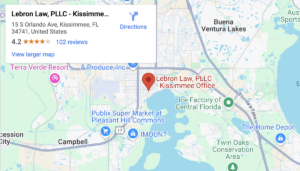Michele A. Lebron | December 9, 2024 | Divorce near Kissimmee, FL

Child custody can be one of the most complex and emotionally charged aspects of divorce. In Florida, legal custody is referred to as “parental responsibility,” while physical custody is called “time-sharing.” While these terms differ slightly from traditional legal and physical custody, the underlying principles are the same. Understanding the difference between these two concepts is crucial for parents, especially when they are navigating Florida’s family law system.
Here’s what you need to know about legal custody (parental responsibility) and physical custody (time-sharing).
What Is Parental Responsibility in Florida?
Legal custody, known in Florida as parental responsibility, refers to the right to make significant decisions about a child’s life. These decisions often involve:
- Education: choices regarding schools, special programs, or extracurricular activities
- Medical care: decisions about doctors, treatments, or health insurance
- Religion: guidance on the child’s spiritual upbringing
Florida courts favor shared parental responsibility. This means both parents share the decision-making authority. If shared responsibility is deemed not in the child’s best interests, the court may award sole parental responsibility to one parent (e.g., cases of abuse or neglect).
What Is Shared Parental Responsibility (Joint Legal Custody)?
Under shared parental responsibility, both parents must collaborate on major decisions regarding the child. This arrangement ensures that both parents maintain involvement in their child’s upbringing, even if the child resides primarily with one parent. Shared parental responsibility has no direct impact on where the child lives. Instead, the focus is solely on the parents’ ability to participate in critical decisions.
What Is Time-Sharing in Florida?
Physical custody, referred to in Florida as time-sharing, determines where the child lives and which parent is responsible for the child’s daily care.
Florida courts require parents to create a parenting plan. This document outlines the time-sharing schedule and each parent’s responsibilities. The plan must be approved by the court and is designed to serve the child’s best interests.
What Is Primary Time-Sharing (Primary Physical Custody)?
In many cases, one parent is designated as the primary residential parent. This means the child spends most of their time living with that parent. The other parent is granted secondary or minority time-sharing. This ensures continued contact and involvement with both parents.
Courts in Florida base time-sharing decisions on a variety of factors, including:
- Each parent’s ability to provide a stable home environment
- The child’s relationship with each parent
- The child’s adjustment to home, school, and community
- Each parent’s willingness to encourage a relationship between the child and the other parent
Florida law presupposes a time-sharing arrangement. However, in some cases, one parent may receive the majority of timesharing.
Do You Need Help With a Custody Case in Florida?
Custody decisions can be overwhelming. You don’t have to face them alone. At Lebron Law, PLLC, we understand the intricacies of Florida family law. We are committed to protecting your rights and your child’s well-being. Whether you’re modifying a parenting plan, seeking modifications, or addressing disputes, we’re here to assist you at (321) 800-5195. Contact Lebron Law, PLLC today for a consultation, and let us guide you through this challenging process.
We serve all through Osceola County and its surrounding areas in Florida. Visit our office at:
Lebron Law, PLLC
15 S Orlando Ave, Kissimmee, FL 34741
(321) 800-5195

